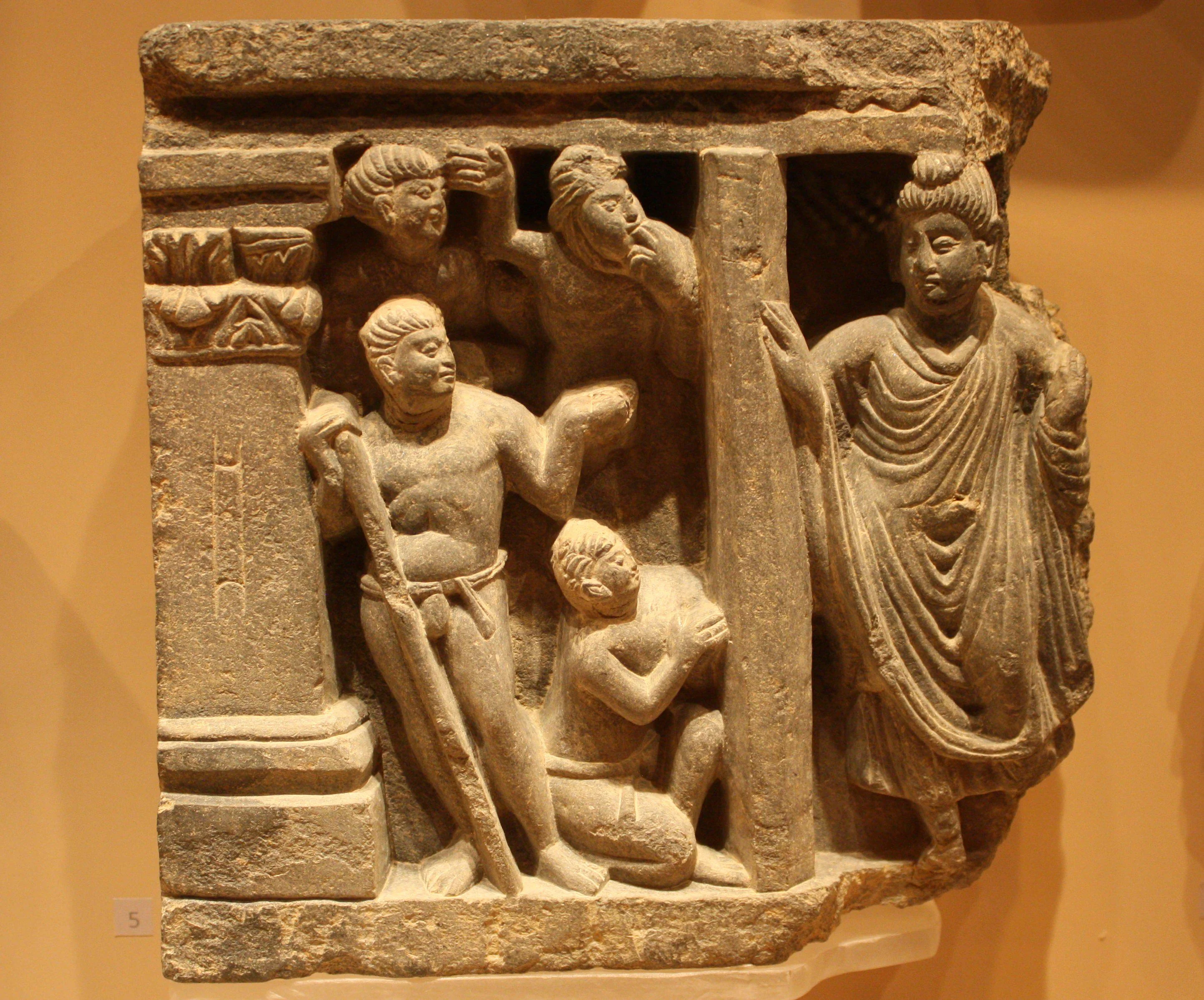Should one aspire for the higher spiritual attainments, one should practice fully in virtue, be devoted to tranquility of mind, not neglect meditation, be endowed with discernment, and practice in an empty dwelling.
Thus I have heard - At one time the Blessed One was dwelling at Sāvatthi, in the Jeta's Grove, Anāthapiṇḍika's park. There, the Blessed One addressed the bhikkhus: "Bhikkhus."
"Venerable sir," those bhikkhus replied to the Blessed One. The Blessed One said this:
"Bhikkhus, dwell being virtuous, accomplished in the moral code of conduct. Dwell restrained by the restraint of this moral code of conduct, mindful of proper behavior and keeping to suitable places, seeing danger even in the slightest faults. Having undertaken this, train in the training guidelines.
Bhikkhus, if a bhikkhu should aspire: 'May I be dear, agreeable, respected, and worthy of veneration among my spiritual companions,' then he should be one who practices fully in virtue, be devoted to tranquility of mind, not neglect meditation, be endowed with discernment, and practice in an empty dwelling.
Bhikkhus, if a bhikkhu should aspire: 'May I be a recipient of robes, alms-food, lodgings, and requisites for the sick, including medicines,' then he should be one who practices fully in virtue, be devoted to tranquility of mind, not neglect meditation, be endowed with discernment, and practice in an empty dwelling.
Bhikkhus, if a bhikkhu should aspire: 'May the service of those from whom I receive robes, alms-food, lodgings, and requisites for the sick, including medicines be fruitful and beneficial,' then he should be one who practices fully in virtue, be devoted to tranquility of mind, not neglect meditation, be endowed with discernment, and practice in an empty dwelling.
Bhikkhus, if a bhikkhu should aspire: 'May the recollection of me by my family, blood relatives, and deceased relatives, who remember me with a trusting mind, be fruitful and beneficial,' then he should be one who practices fully in virtue, be devoted to tranquility of mind, not neglect meditation, be endowed with discernment, and practice in an empty dwelling.
Bhikkhus, if a bhikkhu should aspire: 'May I be one who can endure both dissatisfaction and delight, and may dissatisfaction not overpower me; may I dwell repeatedly overcoming any arisen dissatisfaction,' then he should be one who practices fully in virtue, be devoted to tranquility of mind, not neglect meditation, be endowed with discernment, and practice in an empty dwelling.
Bhikkhus, if a bhikkhu should aspire: 'May I be one who can overcome fear and terror, and may fear and terror not overpower me; may I dwell repeatedly overcoming any arisen fear and terror,' then he should be one who practices fully in virtue, be devoted to tranquility of mind, not neglect meditation, be endowed with discernment, and practice in an empty dwelling.
Bhikkhus, if a bhikkhu should aspire: 'May I be one who gains at will, without difficulty or hardship, the four jhānas — higher states of mind, a pleasant abiding here and now,' then he should be one who practices fully in virtue, be devoted to tranquility of mind, not neglect meditation, be endowed with discernment, and practice in an empty dwelling.
Bhikkhus, if a bhikkhu should aspire: 'May I dwell having directly experienced with the body those peaceful liberations surpassing form, of formless nature,' then he should be one who practices fully in virtue, be devoted to tranquility of mind, not neglect meditation, be endowed with discernment, and practice in an empty dwelling.
Bhikkhus, if a bhikkhu should aspire: 'May I, through the complete exhaustion of the three fetters [1], become a stream-enterer, not liable to states of suffering, assured of liberation and destined for full awakening,' then he should be one who practices fully in virtue, be devoted to tranquility of mind, not neglect meditation, be endowed with discernment, and practice in an empty dwelling.
Bhikkhus, if a bhikkhu should aspire: 'Through the complete exhaustion of the three fetters and the weakening of craving, aversion, and confusion, may I become a once-returner, returning only once more to this world and then making an end of suffering,' then he should be one who practices fully in virtue, be devoted to tranquility of mind, not neglect meditation, be endowed with discernment, and practice in an empty dwelling.
Bhikkhus, if a bhikkhu should aspire: 'Through the complete exhaustion of the five lower fetters [2], may I be one spontaneously reborn and there attain final Nibbāna, with no further return to this world,' then he should be one who practices fully in virtue, be devoted to tranquility of mind, not neglect meditation, be endowed with discernment, and practice in an empty dwelling.
Bhikkhus, if a bhikkhu should aspire: 'May I personally experience the various kinds of psychic abilities: — being one, become many, being many, become one; appearing and disappearing; passing through walls, enclosures, and mountains without obstruction, as though through space; diving into and emerging from the earth as if in water; walking on water without sinking as though on solid ground; traveling cross-legged through the sky, like a bird with wings; touching and stroking the sun and moon with one's hand, mighty and powerful as they are; and having bodily mastery as far as the Brahmā world,' then he should be one who practices fully in virtue, be devoted to tranquility of mind, not neglect meditation, be endowed with discernment, and practice in an empty dwelling.
Bhikkhus, if a bhikkhu should aspire: 'May I, with the divine ear element, which is purified and surpasses the human level, hear both kinds of sounds, divine and human, whether distant or near,' then he should be one who practices fully in virtue, be devoted to tranquility of mind, not neglect meditation, be endowed with discernment, and practice in an empty dwelling.
Bhikkhus, if a bhikkhu should aspire: 'May I, having discerned others' minds with my own mind, understand: a mind with lust as a mind with lust, and a mind without lust as a mind without lust; a mind with hatred as a mind with hatred, and a mind without hatred as a mind without hatred; a mind with delusion as a mind with delusion, and a mind without delusion as a mind without delusion; a contracted mind as a contracted mind, and a distracted mind as a distracted mind; an exalted mind as an exalted mind, and an unexalted mind as an unexalted mind; an inferior mind as an inferior mind, and an unsurpassable mind as an unsurpassable mind; a collected mind as a collected mind, and an uncollected mind as an uncollected mind; a liberated mind as a liberated mind, and an unliberated mind as an unliberated mind,' then he should be one who practices fully in virtue, be devoted to tranquility of mind, not neglect meditation, be endowed with discernment, and practice in an empty dwelling.
Bhikkhus, if a bhikkhu should aspire: 'May I recollect my manifold past lives, such as: one birth, two births, three births, four, five, ten, twenty, thirty, forty, fifty, a hundred, a thousand, a hundred thousand births; many cycles of [universal] contraction, many cycles of [universal] expansion, and many cycles of [universal] contraction and contraction; in such a place I was named so-and-so, of such a clan, with such an appearance, such was my food, such was my experience of pleasure and pain, such was my lifespan; and passing away from there, I was reborn elsewhere; and there too I had such a name, such a clan, such an appearance, such food, experiencing such pleasure and pain, with such a lifespan; and passing away from there, I was reborn here. Thus, with all details and aspects, may I recollect my manifold past lives,' then he should be one who practices fully in virtue, be devoted to tranquility of mind, not neglect meditation, be endowed with discernment, and practice in an empty dwelling.
Bhikkhus, if a bhikkhu should aspire: 'May I, with the divine eye, purified and surpassing human vision, see beings passing away and reappearing, inferior and superior, beautiful and unattractive, in fortunate and unfortunate destinations, and understand them as passing on according to their actions thus: These beings, engaged in bodily, verbal, and mental misconduct, slanderers of the Noble Ones, holding wrong view and undertaking actions based on wrong view, upon the breaking up of the body, after death, have arisen in a state of loss, a bad destination, a place of ruin, even in hell. Or: These beings, engaged in good bodily, verbal, and mental conduct, not slandering the Noble Ones, holding right view and undertaking actions based on right view, upon the breaking up of the body, after death, have arisen in a good destination, the heavenly world. In this way, may I, with the divine eye, purified and surpassing the human, see beings as they pass away and are reborn, inferior and superior, beautiful and unattractive, in fortunate and unfortunate destinations, and understand them as passing on according to their actions,' then he should be one who practices fully in virtue, be devoted to tranquility of mind, not neglect meditation, be endowed with discernment, and practice in an empty dwelling.
Bhikkhus, if a bhikkhu should aspire: 'May I, through the wearing away of the defilements, dwell having directly realized and attained in this very life the taintless liberation of mind and liberation by wisdom, achieved by one's own direct knowledge,' then he should be one who practices fully in virtue, be devoted to tranquility of mind, not neglect meditation, be endowed with discernment, and practice in an empty dwelling.
Bhikkhus, dwell being virtuous, accomplished in the moral code of conduct [3]. Dwell restrained by the restraint of this moral code of conduct, mindful of proper behavior and keeping to suitable places, seeing danger even in the slightest faults. Having undertaken this, train in the training guidelines [4]. Thus was this said, and it is with reference to this that this was said.
The Blessed One said this. Those bhikkhus were satisfied and rejoiced in the Blessed One's words.
[1] The three lower fetters are doubt, personal existence, and adherence to rites and rituals. A person who has overcome them is called a stream-enterer.
[2] The five lower fetters are view(s) relating to personal existence, doubt, adherence to rites and rituals, sensual desire, and ill-will. A person who has overcome them is called a non-returner.
[3] The moral code of conduct is a reference to the Pātimokkha, the monastic code of discipline that governs a monk / bhikkhu / bhikkhuni's conduct to preserve harmony in the community and purity in an individual's conduct. For a lay practitioner interested in practicing the Buddha's teachings, training alongside a monastic community that follows this code well can be a good way to observe for its benefits as well as draw out how one can create a similar set up for oneself outside of the grove. Without this framework in place, one would be starting out from a disadvantage, not having the opportunity to cultivate discernment about the role of purity in being able to fulfill spiritual aspirations.
[4] The training guidelines are the Buddha's teachings, common to both monastics and lay practitioners, where one is learning them, then applying them for a period of time to independently observe the effects of application on the growth of the positive mental qualities and in the decline of the negative mental qualities. During the lifetime of the Buddha, the lay practitioners were able to attain to these aspirations, as linked in the discourse of Ugga, the householder of Vesālī.
Related Teachings:
Being well composed in virtues (DhP 9, 10)
Who is the Dhamma for | Eight thoughts of a great person (AN 8.30) - This teaching shares eight qualities of a great person, which leads them to the realization of the fruit of Dhamma, enlightenment, Nibbāna.
Ugga, the householder of Vesālī (AN 8.21) - Ugga, the householder of Vesālī is endowed with eight wonderful and marvelous qualities.
The five precepts (AN 8.39) - The Buddha shares the five precepts as five gifts that one can offer to all beings.





















